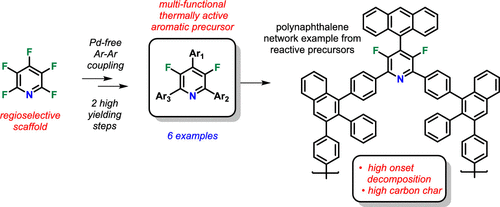当前位置:
X-MOL 学术
›
ACS Macro Lett.
›
论文详情
Our official English website, www.x-mol.net, welcomes your feedback! (Note: you will need to create a separate account there.)
Exploiting the Site Selectivity of Perfluoropyridine for Facile Access to Densified Polyarylene Networks for Carbon-Rich Materials
ACS Macro Letters ( IF 5.8 ) Pub Date : 2020-06-16 , DOI: 10.1021/acsmacrolett.0c00298 Matthew B Houck 1 , Loren C Brown 1 , Robert H Lambeth 2 , Scott T Iacono 1
ACS Macro Letters ( IF 5.8 ) Pub Date : 2020-06-16 , DOI: 10.1021/acsmacrolett.0c00298 Matthew B Houck 1 , Loren C Brown 1 , Robert H Lambeth 2 , Scott T Iacono 1
Affiliation

|
Fluorinated molecules containing reactive functionalities are of great interest to the materials community as these compounds can be used to prepare fluorinated polymers with desirable physical and electronic properties. Despite their potential, many of these compounds are limited by their synthesis which generally requires transition-metal-catalyzed coupling reactions or harsh fluorinating conditions. Perfluoroheteroaromatic compounds provide a unique solution to this problem as compounds such as perfluoropyridine can undergo SNAr reactions with a wide range of simple nucleophiles in a controlled and regioselective manner. Herein we report the transition-metal-free synthesis of a pool of highly soluble high aromatic content (HAC) perfluoropyridine-based thermosetting precursors and compounds of interest which can be easily obtained from readily available chemical precursors using simple nucleophilic chemistries. These thermally active monomers cure readily, in 350–400 °C temperature ranges, into highly densified polyaryelene networks and demonstrate decomposition temperatures well above 400 °C and high char yields at 900 °C, making these promising materials for high-temperature applications as well as templates for carbon-based nanomaterials.
中文翻译:

利用全氟吡啶的位点选择性来方便地获取富碳材料的致密聚亚芳基网络
材料界对含有反应性官能团的氟化分子非常感兴趣,因为这些化合物可用于制备具有所需物理和电子特性的氟化聚合物。尽管它们具有潜力,但这些化合物中的许多都受到其合成的限制,通常需要过渡金属催化的偶联反应或苛刻的氟化条件。全氟杂芳族化合物为这个问题提供了独特的解决方案,因为全氟吡啶等化合物可以经历 S NAr 以受控和区域选择性的方式与各种简单的亲核试剂发生反应。在这里,我们报告了高可溶性高芳烃含量 (HAC) 全氟吡啶基热固性前体和感兴趣的化合物的无过渡金属合成,这些前体和感兴趣的化合物可以使用简单的亲核化学从现成的化学前体中轻松获得。这些热活性单体在 350-400 °C 的温度范围内很容易固化成高度致密的聚亚芳基网络,并表现出远高于 400 °C 的分解温度和 900 °C 时的高成炭率,使这些有前途的材料也适用于高温应用作为碳基纳米材料的模板。
更新日期:2020-07-21
中文翻译:

利用全氟吡啶的位点选择性来方便地获取富碳材料的致密聚亚芳基网络
材料界对含有反应性官能团的氟化分子非常感兴趣,因为这些化合物可用于制备具有所需物理和电子特性的氟化聚合物。尽管它们具有潜力,但这些化合物中的许多都受到其合成的限制,通常需要过渡金属催化的偶联反应或苛刻的氟化条件。全氟杂芳族化合物为这个问题提供了独特的解决方案,因为全氟吡啶等化合物可以经历 S NAr 以受控和区域选择性的方式与各种简单的亲核试剂发生反应。在这里,我们报告了高可溶性高芳烃含量 (HAC) 全氟吡啶基热固性前体和感兴趣的化合物的无过渡金属合成,这些前体和感兴趣的化合物可以使用简单的亲核化学从现成的化学前体中轻松获得。这些热活性单体在 350-400 °C 的温度范围内很容易固化成高度致密的聚亚芳基网络,并表现出远高于 400 °C 的分解温度和 900 °C 时的高成炭率,使这些有前途的材料也适用于高温应用作为碳基纳米材料的模板。


























 京公网安备 11010802027423号
京公网安备 11010802027423号